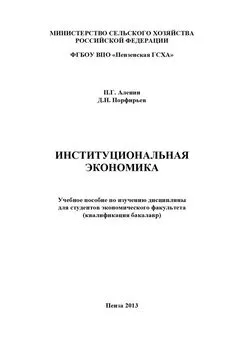Марина Одинцова - Институциональная экономика
- Название:Институциональная экономика
- Автор:
- Жанр:
- Издательство:неизвестно
- Год:неизвестен
- ISBN:нет данных
- Рейтинг:
- Избранное:Добавить в избранное
-
Отзывы:
-
Ваша оценка:
Марина Одинцова - Институциональная экономика краткое содержание
Настоящее пособие представляет собой введение в курс институциональной экономики. В соответствии со сложившейся традицией преподавания этой дисциплины в нем рассматриваются основные понятия институциональной теории – формальные и неформальные институты, трансакционные издержки, права собственности, контракты; предлагается институциональное объяснение фирмы, государства; освещаются проблемы развития институтов. Пособие подготовлено с учетом многолетнего опыта автора в преподавании данного курса для студентов факультета права, при этом учтена специфика подготовки юристов, а также их мышления и восприятия.
Для студентов, аспирантов и преподавателей экономических специальностей.
Институциональная экономика - читать онлайн бесплатно ознакомительный отрывок
Интервал:
Закладка:
Kronman A. Contract Law and the State of Nature // Journal of Law, Economics and Organization. 1985. Vol. 1. No. 1. P. 5—32.
Krug B., Polos L. Entrepreneurs, Enterprises and Evolution. The Case of China: paper, presented at The Annual Meeting of ISNIE, Tuebingen, Sept. 21–23, 2000.
Lazear E. Why Is There Mandatory Retirement? // Journal of Political Economy. 1979. Vol. 87. P. 1261–1284.
Lessig L. The Regulation of Social Meaning // The University of Chicago Law Review. 1995. Vol. 62. No. 3. P. 943—1045.
Libecap G. Common Property // Palgrave Dictionary of Economics and The Law / ed. by P. Newman. L.: Macmillan Reference Ltd, 1998. Vol. 1. P. 317–323.
Libecap G. Distributional Issues in Contracting for Property Rights // Journal of Institutional and Theoretical Economics. 1989. Vol. 145. No. 1. P. 6–24.
Libecap G. The Political Allocation of Mineral Rights: a Reevaluation of Teapot Dome // Journal of Economic History. 1984. Vol. 44. No. 2. P. 381–391.
Libecap G.D. Economic Variables and the Development of the Law: The Case of Western Mineral Rights // The Journal of Economic History. 1978. Vol. 38. P. 338–362.
Liebowitz S.J., Margolis S.E. Path Dependence, Lock-in and History // Journal of Law, Economics and Organization. 1995. Vol. 11. No. 1. P. 205–226.
Lindsay C. A Theory of Government Enterprise // The Journal of Political Economy. 1976. Vol. 84. No. 5. P. 1061–1078.
Macneil J. Contracts: Adjustment of Long-Term Economic Relations under Classical, Neoclassical, and Relational Contract Law // New Wisconsin University Law Review. 1977–1978. Vol. 72. No. 6. P. 854–905.
Malhotra D., Murnighan K. The Effects of Contrasts on Interpersonal Trust // Administrative Science Quarterly. 2002. Vol. 47. No. 3. P. 534–559.
Manne H. Mergers and the Market for Corporate Control // Journal of Political Economy. 1965. Vol. 73. No. 1. P. 110–120.
Masten S.E., Meehan J.W., Snyder E.A. The Costs of Organization // Journal of Law, Economics and Organization. 1991. Vol. 7. No. 1. P. 1—27.
Mattei U. Property Rights in Civil Law Countries // The New Palgrave Dictionary of Economics and the Law / P. Newman (ed.). Macmillan Reference Ltd, 1998. Vol. 3. P. 157–166.
McAdams R. The Origin, Development, and Regulation of Norms // Michigan Law Review. 1997–1998. Vol. 96. No. 1. P. 348–433.
McCloskey D. The Enclosure of Open Fields: Preface to a Study of Its Impact on the Efficiency of English Agriculture in the Eighteenth Century // The Journal of Economic History. 1972. Vol. 32. No. 1. P. 15–35.
McGuire М., Olson M. The Economics of Autocracy and Majority Rule: The Invisible Hand and the Rule of Force // Journal of Economic Literature. 1996. Vol. 34. No. 1. P. 72–96.
Menard C. Enforcement Procedures and Governance Structures: What Relationship? // Institutions, Contracts and Organizations. Perspectives from New Institutional Economics / ed. by C. Menard. Cheltenham, UK: Edward Elgar, 2000. P. 234–253.
Menard C. On Clusters, Hybrids and Other Strange Forms: The Case of French Poultry Industry // Journal of Institutional and Theoretical Economics. 1996. Vol. 152. No. 1. P. 154–183.
Merry man J.H. Ownership and Estate (Variations on a Theme by Lawson) // Tulane Law Review. 1974. Vol. 48. P. 916–945.
Michelman F. Property, Utility, and Fairness: Comments on the Ethical Foundations of “Just Compensation” Law // Harvard Law Review. 1967. Vol. 80. No. 6. P. 1165–1268.
Michelman F. States’ Rights and States’ Roles: Permutations of “Sovereignty” in National League of Cities v. Usury // Yale Law Journal. 1977. Vol. 86.No. 6. P. 1165–1195.
Milgrom P. Employment Contracts, Influence Activities and Organization Design //Journal of Political Economy. 1988. Vol. 96. P. 42–60.
Milgrom P., North D., Weingast В . The Role of Institutions in the Revival of Trade: The Medieval Law Merchant // Economics and Politics. 1990. Vol. 2. No. 1. P. 1–23.
Mill J.S. Principles of Political Economy with Some of Their Applications to Social Philosophy. J.M. Robson (ed.). Toronto: University of Toronto Press, 1965.
Miller G.J. Managerial Dilemmas. The Political Economy Of Hierarchy. Cambridge: CUP, 1992.
Muris T. Opportunistic Behavior and the Law of Contracts // Minnesota Law Review. 1980–1981. Vol. 65. P. 521–590.
Nelson Ph. Advertising as Information // Journal of Political Economy. 1974. Vol. 82. P. 729–754.
Nelson Ph. Information and Consumer Behavior // Journal of Political Economy. 1970. Vol. 78. No. 2. P. 311–329.
Niehans J. Transaction Costs // The Palgrave Dictionary of Economics. L.: Macmillan, 1987. P. 676–679.
North D. Economic Performance through Time. Alfred Nobel Memorial Prize Lecture in Economic Science // American Economic Review. 1994. Vol. 84. No. 3. P. 359–368.
North D. Institutions and Credible Commitment // Journal of Institutional and Theoretical Economics. 1993. Vol. 149. No. 1. P. 11–23.
North D. Structure and Change in Economic History. No. Y.; L.: W.W. Norton & Company, 1981.
North D. Understanding the Process of Economic Change. Princeton and Oxford: Princeton University Press, 2005.
North D., Thomas R. The First Economic Revolution // Economic History Review. 1977. Vol. 30. No. 2. P. 229–241.
North C.D., Thomas R.P. The Rise of the Western World. A New Economic History. Cambridge: CUP, 1973.
Oehvall D. Economic Analysis of the Title to Stolen Personal Property. Master Thesis LLM in Law and Economics. University of Manchester, 2004.
Olson M. Collective Action // The New Palgrave: A Dictionary of Economics. L.: Macmillan, 1987. P. 474–477.
Olson M. The Rise and Decline of Nations. New Haven: Yale University Press, 1982.
Ostrom E. Governing the Commons: The Evolution of Institutions for Collective Action. Cambridge: CUP, 1990. P. 58–63.
Ostrom E. Private and Common Property Rights // Encyclopedia of Law and Economics / ed. by B. Bouckaert, G. DeGeest. Cheltenham, UK: Edward Elgar, 2000. P. 332–379.
Ostrom E. Self-Governance of Common-Pool Resources // Palgrave Dictionary of Economics and the Law / ed. by P. Newman. L.: Macmillan Reference Ltd, 1998. Vol. 1. P. 424–432.
Ott С., Schaeffer Я.-В. Emergence and Construction of Efficient Rules in the Legal System of German Civil Law // International Review of Law and Economics. 1993. Vol. 13. No. 3. R 285–302.
Parisi F. The Genesis of Liability in Ancient Law // American Law and Economics Review. 2001. Vol. 3. No. 1. R 82—124.
Penrose E. Biological Analogies in the Theory of the Firm // American Economic Review. 1952. Vol. 42. No. 5. R 804–819.
Pildes R. The Destruction of Social Capital through Law // University of Pennsylvania Law Review. 1996. Vol. 144. No. 5. P. 2055–2077.
Polinsky M. An Introduction to Law and Economics. 2nd ed. Boston and Toronto: Little, Brown and Company, 1989.
Posner E. Agency Models in Law and Economics // The Law School of the Unversity of Chicago. 2000a. http://papers.ssm.com/paper.taf7abstract_ id=204872
Posner E. Social Norms and the Law. Cambridge, Mass.: Harvard University Press, 2000b.
Posner R. Social Norms and the Law: an Economic Approach //American Economic Review. 1997. Vol. 87. No. 2. P. 365–369.
Posner R. The Economics of Justice. Massachussetts and L.: Harvard University Press, 1983.
Posner R., Rasmusen E. Creating and Enforcing Norms, with Special Reference to Sanctions // International Review of Law and Economics. 1999. Vol. 19. P. 369–382.
Roberts J. The Modern Firm. Organizational Design for Performance and Growth. Oxford: Oxford University Press, 2004.
Roe M.J. Chaos and Evolution in Law and Economics // Harvard Law Review. 1996. Vol. 109. No. 3. P. 641–668.
Rose C. Propter Honoris Respectum: Property as the Keystone Right? // Notre Dame Law Review. 1996. Vol. 71.
Rose-Ackermann S. Inalienability and the Theory of Property Rights // Columbia Law Review. 1985. Vol. 85. No. 5. P. 931–969.
Rubinfeld D., Scotchmer S. Contingent Fees // Palgrave Dictionary of Economics and the Law / ed. by P. Newman. L.: Macmillan Reference Ltd, 1998. Vol. 1. P. 415–420.
Rubinfeld D., Scotchmer S. Contingent Fees for Attorneys: An Economic Analysis // RAND Journal of Economics. 1993. Vol. 24. No. 3. P. 343–356.
Schotter A. The Economic Theory of Social Institutions. Cambridge: CUP, 1981.
Schwartz A. Relational Contracts in the Courts: An Analysis of Incomplete Agreements and Judicial Strategies // The Journal of Legal Studies. 1992. Vol. 21. No. 2. P. 271–318.
Schwartz W., Baxter K., Ryan D. The Duel: Can These Gentlemen Be Acting Efficiently? // The Journal of Legal Studies. 1984. Vol. 13. No. 2. P. 321–355.
Schwartz М., Mitchell D. An Economic Analysis of the Contingent Fee in Personal-Injury Litigation // Stanford Law Review. 1970. Vol. 22. No. 6. P. 1125–1162.
Sen A. Labour Allocation in a Cooperative Enterprise // Review of Economic Studies. 1966. Vol. 33. No. 4. P. 361–371.
Spence A.M. Job Market Signalling // Quarterly Journal of Economics. 1973. Vol. 87. No. 3. P. 355–374.
Sunstein C. On the Expressive Function of Law // University of Pennsylvania Law Review. 1996. Vol. 144. No. 5. P. 2021–2053.
Telser L.G. A Theory of Self-Enforcing Agreements // Journal of Business. 1981. Vol. 53. No. 1. P. 27–44.
Ullman-Margalit E. The Emergence of Norms. Oxford: Clarendon Press, 1977.
Umbeck J. A Theory of Contractual Choice and the California Gold Rush // Journal of Law and Economics. 1978. Vol. 21. No. 2. P. 421–437.
Vanneste S., Van Hiel A., Parisi F. Depoorter, B. From “Tragedy» to “Disaster”: Welfare Effects of Commons and Anticommons Dilemmas. George Mason University School of Law. Law and Economics Working Paper Series. http://ssrn.com./absract_id=548622
Van Zandt D. The Lessons of the Lighthouse: “Government” or “Private” Provision of Goods // Journal of Legal Studies. 1993. Vol. 23. No. 1. P. 47–72.
Viscusi K., Vernon J. Economics of Regulation and Anti-Trust. 3rd ed. Cambridge, Mass.: MIT, 2000.
Williamson O. Comparative Economic Organization: The Analysis of Discrete Structural Alternatives // Administrative Science Quarterly. 1991. Vol. 36. No. 2. P. 269–296.
Williamson O.E. Calculativeness, Trust, and Economic Organization // Journal of Law and Economics. 1993. Vol. 36. No. 1 (part 2). P. 453–486.
Young P.H. The Economics of Convention // Journal of Economic Perspectives. 1996. Vol. 10. No. 1. P. 105–122.Примечания
1
Об использовании игр см. Приложение к главе 1.
2
Равновесие по Нэшу – это набор стратегий (одна для каждого игрока) такой, что ни один из игроков не имеет стимула отклоняться от своей стратегии.
3
Ситуация будет эффективной по Парето, если ни один из игроков не может улучшить свое положение, не ухудшив при этом положения другого игрока.
Читать дальшеИнтервал:
Закладка:








